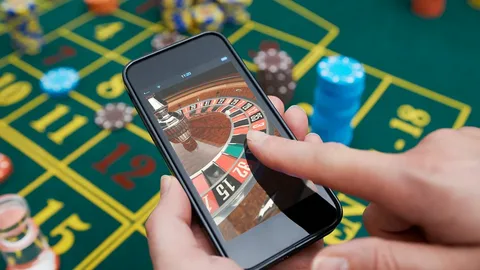The world of casinos is shrouded in a captivating mystique, fueling countless urban legends and misconceptions. From “lucky” machines to elaborate conspiracy theories, these myths often stem from a misunderstanding of how casino games truly work, the psychology of gambling, and the stringent regulations governing the industry.
It’s time to separate fact from fiction. Here are 10 common non GamStop casinos myths, debunked:
Myth 1: Slot Machines Are “Due” to Pay Out (or are “Tight” or “Loose”)
The Myth: Players often believe that a slot machine that hasn’t paid out in a while is “due” for a win, or conversely, that a machine that just paid a jackpot won’t pay again soon. People also look for “loose” machines that pay more often.
The Reality: Modern slot machines operate on Random Number Generators (RNGs). An RNG is a computer program that constantly cycles through thousands of numbers per second, determining the outcome of each spin at the exact moment you hit the “spin” button. Each spin is a completely independent event, unaffected by previous results. The machine has no “memory” of past payouts or what it’s “due” to do. “Loose” or “tight” machines are a fallacy; they just operate on their programmed Return to Player (RTP) percentage over millions of spins, not in short-term cycles.
Myth 2: Casinos Pump Oxygen Through the Vents to Keep You Awake
The Myth: This enduring myth suggests casinos pipe pure oxygen into the gaming floor to keep players awake, alert, and gambling longer.
The Reality: This is entirely false and, more importantly, illegal and extremely dangerous. Pumping pure oxygen into a public space would create a massive fire hazard, risking an explosion. Casinos use sophisticated HVAC systems to ensure comfortable temperatures and good air circulation, but they are absolutely not pumping oxygen. The stimulating environment (lights, sounds, complimentary drinks) is what contributes to players feeling more awake.
Myth 3: Dealers Control Whether You Win or Lose
The Myth: Some players believe that a dealer can deliberately deal you a bad hand in Blackjack or make the roulette ball land where they want.
The Reality: Dealers are trained professionals who operate games according to strict rules. In games like Blackjack, cards are dealt from a shuffled shoe, and the order is random. In Roulette, the spin of the wheel and the drop of the ball are governed by physics and randomness, not the dealer’s will. Their job is to facilitate the game fairly and efficiently, not to manipulate outcomes. Casino games are under constant surveillance precisely to ensure fair play from all parties.
Myth 4: Card Counting in Blackjack is Illegal
The Myth: Many people believe that counting cards in Blackjack is against the law and will lead to arrest.
The Reality: Card counting is not illegal. It’s a mental strategy that involves using your brain to track the ratio of high to low cards remaining in the deck, allowing you to make more informed betting and playing decisions. However, casinos are private businesses and have the right to refuse service. If a casino suspects you are counting cards, they can (and often will) ask you to leave, bar you from their property, or simply “shuffle up” more frequently to neutralize the advantage.
Myth 5: You Can Beat Roulette with a Betting System (e.g., Martingale)
The Myth: Systems like the Martingale (doubling your bet after every loss) promise a guaranteed win if you stick with them.
The Reality: While such systems seem mathematically sound on paper, they invariably fail in real casino environments due to two critical factors:
- Table Limits: All casino tables have maximum betting limits. A losing streak, even a short one, can quickly cause your doubled bets to exceed this limit, making it impossible to continue the system.
- Bankroll Limitations: Even without table limits, a gambler’s personal bankroll is finite. A prolonged losing streak (which is statistically inevitable over enough trials) would bankrupt the player before the system could guarantee a win. Roulette remains a game of pure chance, and no betting system can alter the game’s inherent house edge.
Myth 6: Machines/Tables Run “Hot” or “Cold” in Streaks
The Myth: Players often believe that a machine or table that’s been winning a lot is “hot” and will continue to win, or a losing one is “cold” and won’t pay out.
The Reality: This is the “gambler’s fallacy” at play. As with slot machines (Myth 1), each outcome in a casino game is an independent event. The dice don’t remember past rolls, the cards don’t remember past hands, and the roulette wheel doesn’t remember past spins. Streaks are simply a natural occurrence of randomness, not an indicator of future outcomes.
Myth 7: Casinos Don’t Want You to Win
The Myth: Some believe casinos actively conspire to ensure players lose all their money.
The Reality: While casinos are in the business of making a profit (thanks to the house edge), they absolutely do want people to win occasionally. Why? Because winners generate excitement, create positive word-of-mouth, and, most importantly, encourage others to play. A casino where nobody ever wins would quickly lose its appeal and its customer base. Casinos rely on the excitement of winning, even if it’s not every time, to keep players coming back.
Myth 8: There are Predictable Patterns in Random Games
The Myth: Gamblers spend hours trying to identify patterns in roulette spins, craps rolls, or slot machine outcomes, believing these patterns will reveal future results.
The Reality: Games based on RNGs or truly random physical processes (like a well-maintained roulette wheel or fair dice) are designed to be unpredictable. Any perceived “patterns” are coincidental and products of the human mind’s tendency to find order in chaos. Relying on such patterns will lead to flawed betting decisions.
Myth 9: Gambling is a Reliable Way to Make Money
The Myth: With enough luck or a clever system, one can consistently make a living or get rich through casino gambling.
The Reality: For the vast majority of people, gambling is a form of entertainment, not a source of income. The house edge ensures that over the long term, the casino will always come out ahead. While professional gamblers exist (primarily in poker, where they play against other players, or through advanced advantage play like card counting in very specific conditions), this is extremely rare and requires immense skill, discipline, and a significant bankroll. For the average person, gambling should always be seen as an expense for entertainment.
Myth 10: The Best Way to Win is to Play Alone at a Table
The Myth: Some players believe that playing alone at a table (e.g., Blackjack) gives them better odds because the dealer’s attention is solely on them, or because they “get more hands.”
The Reality: While you might get more hands per hour, the odds of the game do not change whether you are playing alone or with a full table of players. The dealer’s job is to follow the rules of the game regardless of the number of players. The house edge remains constant. The only benefit of playing alone might be a faster pace if that’s what you prefer, but it doesn’t improve your chances of winning.
By understanding these common myths and the underlying realities of casino operations, players can approach their gambling experience with clearer expectations, make more informed decisions, and ultimately enjoy their time at the casino more responsibly.








